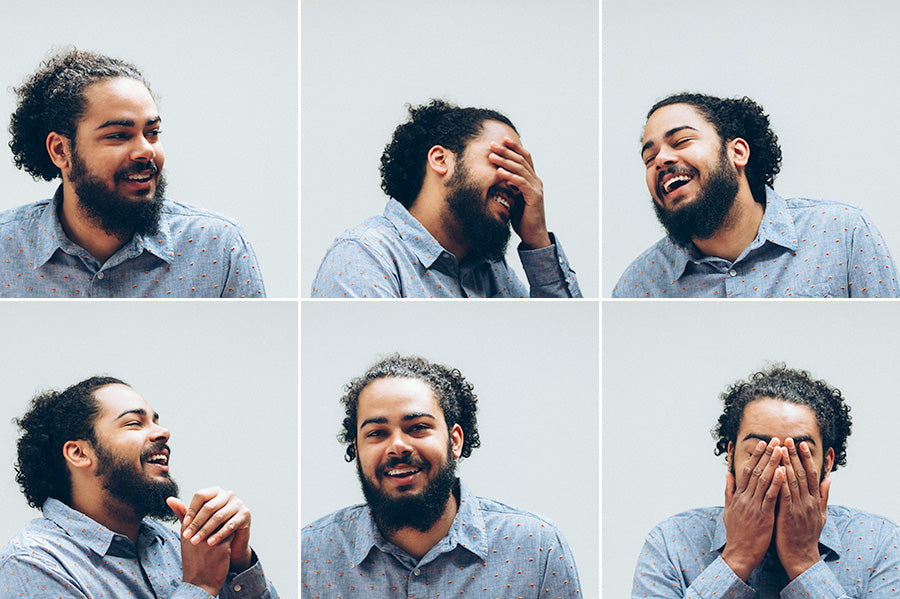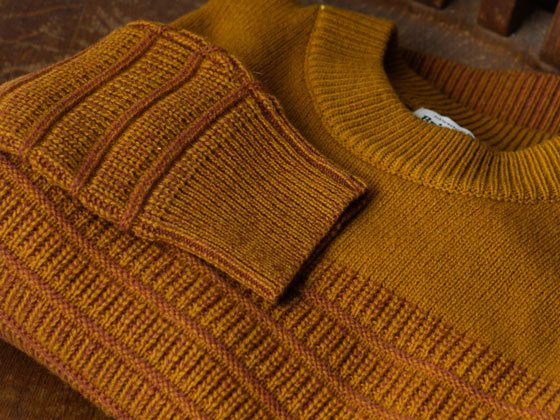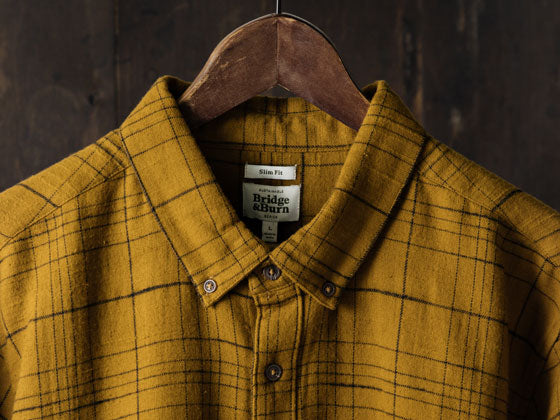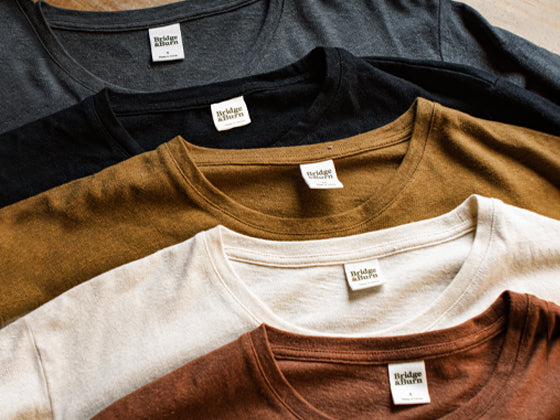Creating Bridge & Burn required a leap of faith. Founder, Erik Prowell quit his job as a software developer, lit the proverbial match, and threw it—burning the bridge of working for anyone else behind him. With no formal training he trusted his smarts and his strong work ethic, and took the plunge. In that spirit, Bridge Burners is a series showcasing people who are taking a similar leap.
Nobody immediately associates Portland with blissful diversity, but comedian Curtis Cook says a certain kind of variety is exactly the reason he chose this city to launch his stand-up career.
Originally from Cleveland, OH, Curtis knows about diversity. “Portland is pretty homogenous and white in a way that Cleveland is not, which is a bummer,” he concedes, “but both cities have the ability to fill audiences with mixed-age crowds that are a total blend of people with warehouse jobs, older professionals, and young kids who just graduated from college. They all share ideals. I mean, Portland crowds are brutally white, but there’s still something unique about the audiences here. ”

That spectrum lets him mix it up and learn a lot as a comic—differently than he might have back home in Ohio where he graduated from a respected liberal arts college. Race aside, he says, “If it’s one place full of ivy league graduates I think a show will be just as boring as it would be in a small town where no one does anything but factory work. I’m not trying to say one is better than the other, but I like to have a place where there’s a little bit of a mix.” What’s special about Portland, he says, is people come from different backgrounds and parts of the US, and the city is a supportive home to all of them.
Not that moving here straight out of college wasn’t a bit of a jolt. After moving across the country he initially stayed with a friend’s parents while he settled in. “We saved up all this money and worked really hard, got an apartment, and I was like great! We are adults now!” he says. “And in fact I was so much not an adult that I didn’t realize apartments didn’t come with beds.”
Curtis was initially a bit sheepish to be included in this series. He says, “I feel awkward because I haven’t fully burned the bridge of working for other people. I’m still clinging to that part time temp job.” But in fact, he shares something that all Bridge Burners have in common: making massive sacrifices, working a lot and really loving what they do. Plenty of our Bridge Burners (Erik included) held onto a reliable paycheck while they figured out how to make what they love truly viable.
With something as intangible as comedy, taking the leap is tough. “I think you can be talented enough in a trade to get a loan and start a business, but you can’t start a business just with words. To be successful enough in an art that you don’t need a day job sounds insane to me right now, but I hope to get there one day.”
Until that day comes, Curtis’s various temp jobs—which have spanned the gamut from scrubbing glass bottles with a dry rag to working in a stock room to making wine labels—give him plenty of time to mentally explore new material for shows. Though he says: “I never made a joke about scrubbing glass bottles. I never found a way to make that not just miserable.”
High risk as it is, his parents have been nothing but supportive of his decision to pursue comedy. If they had concerns about him throwing away any professional potential, he says it was probably a conversation they would have had when he chose his college majors: writing and film. “I think having already thrown away so much by doing those degrees, choosing this career was as reasonable as choosing anything else in their minds,” he laughs.
And building a career in comedy possibly takes more time and diligence than building a standard profession. Curtis works hard. Ten-hour shifts are followed by almost-nightly open mics and showcases where he hones his distinctive fast-talking, long-winded brand of comedy (he’s known for his long slow-building rants that end in a clever payoff); on his three remaining days he works on material, makes a podcast, does interviews and essentially hustles. Growing up, he says, “I just thought you walked around being funny until one day you were so good at naturally being funny that Bob Hope parted the clouds and gave you a sitcom.”
But in fact, “There’re a lot of talented people in comedy who are really good at what they do and then that’s it. They don’t do anything with it. And that’s not enough. I think everyone’s gotta be on their grind to make it work.”

Not everyone is up for that level of risk. It’s a scary prospect. Unlike other jobs that have a set career path—milestones to tick off that push you to the next step up—there’s no tried and true route up the ladder of comedy, and no guarantees. “There’s the constant fear of utter failure, without a net. There’s no demotion, there’s just: great that was your one chance! ...When you see a biopic or read an autobiography, it’s all these people who have sacrificed everything and made it, but when you actually start doing comedy you see all these people who sacrificed everything but didn’t really get that far. Being exposed to that side of things adds a daunting perspective.”
On the flip side, the other frightening thing, he says, is being successful but losing the reasons you wanted that success in the first place: “It is really rough. You’ll see people going on stage telling jokes they don’t believe in—jokes they don’t want to be telling, but they get paid for it. And at that point I think: why aren’t you just doing a different job you don’t like?”
The latter seems an unlikely risk for Curtis. To him, hitting his flow on stage is borderline-transcendent: “There’s this super cheesy and ridiculous thing that happens sometimes when I’m on stage saying jokes and then there’s just a blackout when it’s like I’m there but I’m not there, and everything is going the way I want it to—I know what to say and how it’s gonna go, and everything’s going exactly that way. Knowing that that might come back for a minute is like, the best,” he says. “It sounds really over romanticised. But that feeling is always what I want when I do a show.”
There’s another thing Curtis shares with our other Bridge Burners: no real backup plan. For each of them, what they do isn’t just a job. It’s a complete, all-encompassing lifestyle. That, says Curtis has been the most unexpected part about his comedy career.
“I was surprised by how constantly personal it is. Like if I go to a job and some guy’s a jerk it doesn’t matter because these are just people I work with. I thought comedy would be the same feeling, but you’re really with these people and it’s such an enveloping thing. There’s a deep culture behind it that just stays with you presently, at all times.”
When you love what you do, that right there can be the mark of success. But for Curtis, success will look like eventually quitting his day job and dedicating himself completely to writing and stand-up. Then, maybe one day: “I want to be good enough that if you hear my voice or a joke I wrote, you’re just like, ‘That’s Curtis.’ Then if I could Don-Rickles-it—like I get to be old but my voice is so well-known that I’m the go-to guy for big-budget children’s movies—I’ll be like ‘yo, I made it.’ Being a voice in a children’s cartoon is the epitome of my dream right now.”
He’s got some time to get there. Until then, he’ll be entertaining “mixed” crowds across Bridge City (and maybe saving for a grownup duvet). “I’m young enough and things are going well enough for as long as I’ve been doing this, that I’ve just been letting myself go with the dream.”
For constant entertainment, follow Curtis on twitter.
Written by Amanda Lee Smith.








